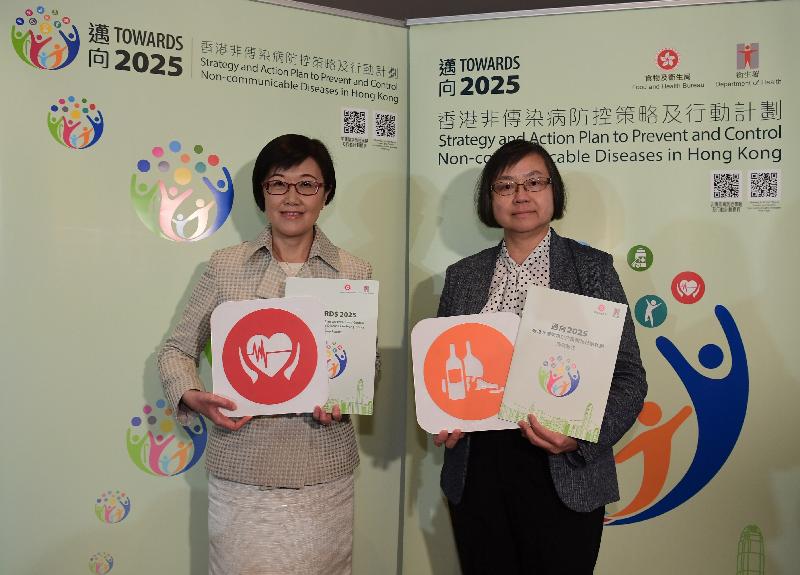Government launches strategy and action plan to prevent and control non-communicable diseases (with photos)
******************************************************************************************
Entitled "Towards 2025: Strategy and Action Plan to Prevent and Control Non-communicable Diseases in Hong Kong", the SAP defines nine local targets to be achieved by 2025 and a sustained and systematic portfolio of initiatives to introduce interventions throughout the course of life to help prevent occurrence and progress of NCD, thereby addressing the NCD burden. The SAP was formulated by the Steering Committee on Prevention and Control of NCD chaired by the Secretary for Food and Health to echo the World Health Organization (WHO)'s call for developing a multi-sectoral action plan to combat the threat of NCD.
Announcing the key elements of the SAP at the press conference today (May 4), the Director of Health, Dr Constance Chan, said that similar to many countries and jurisdictions, Hong Kong faces an increasing problem of NCDs, which is compounded by an ageing population. In 2016, the major NCDs, namely cancers, cardiovascular diseases including heart diseases and stroke, diabetes and chronic respiratory diseases accounted for about 55 per cent of all registered deaths. In the same year, NCDs caused about 104 600 potential years of life lost before the age of 70.
Dr Chan also expressed her concern about the unhealthy lifestyle practices of Hong Kong people. According to the findings of the Population Health Survey 2014/15 by the Department of Health (DH), about 86 per cent of local people aged 15 to 84 had salt intake in excess of WHO's recommended limit of less than 5 grams a day; over 90 per cent of people aged 15 or above consumed less than the recommended five servings of fruit and vegetables a day; 13 per cent of people aged 15 or above did not have adequate levels of physical activity to be of benefit to health; about 60 per cent of people aged 15 or above had consumed alcohol in the last 12 months; and 50 per cent of people aged 15 to 84 were overweight or obese.
"At least a third of NCDs can be prevented through adopting a healthy lifestyle. A growing body of evidence is available to show that leading causes and underlying risk factors for NCDs can be effectively tackled through population-based interventions that encourage healthy lifestyles," Dr Chan said.
She pointed out that to align with the WHO's Global Action Plan for the Prevention and Control of NCD 2013-2020, the SAP in Hong Kong will focus on four NCDs (namely cancers, cardiovascular diseases, diabetes and chronic respiratory diseases) and four shared behavioural risk factors (namely unhealthy diet, physical inactivity, tobacco use and harmful use of alcohol) that are potentially preventable or modifiable and which would have a significant impact on population health.
The SAP sets out the following nine health targets to be achieved by 2025:
Target 1: A 25 per cent relative reduction in risk of premature mortality from cardiovascular diseases, cancer, diabetes, or chronic respiratory diseases
Target 2: At least a 10 per cent relative reduction in the prevalence of binge drinking and harmful use of alcohol (harmful drinking/alcohol dependence) among adults and in the prevalence of drinking among youths
Target 3: A 10 per cent relative reduction in prevalence of insufficient physical activity among adolescents and adults
Target 4: A 30 per cent relative reduction in mean population daily intake of salt/sodium
Target 5: A 30 per cent relative reduction in prevalence of current tobacco use in persons aged 15+ years
Target 6: Contain the prevalence of raised blood pressure
Target 7: Halt the rise in diabetes and obesity
Target 8: Prevent heart attacks and strokes through drug therapy and counselling
Target 9: Improve availability of affordable basic technologies and essential medicines to treat major NCDs
To reach the targets, new strategic directions need to be adopted to accelerate the actions on the NCD reduction agenda. The Government will demonstrate leadership in many ways, such as by transforming schools into healthy settings for students' development, creating supportive physical and social environments for physical activity, fostering effective partnerships with primary care professionals, and keeping in view accumulating evidence and overseas experience on interventions recommended by the WHO.
The SAP has put forward a systematic portfolio of NCD policies, programmes and actions, including:
- Strengthening NCD surveillance by enhancing the existing surveys and information collection to keep track of population-based NCD status and key behavioural and biomedical risks;
- Carrying out alcohol screening and brief interventions, including to strengthen treatment services for people with alcohol problems and support people who want to cut down or stop drinking alongside stepped up education;
- Promoting physical activity participation in schools and society by collaborating with the education sector and other sectors with enhanced opportunities and accessibility to physical activity;
- Continuing discussion with the trade on product reformulation to reduce salt in food alongside ongoing efforts to implement various salt reduction schemes and dialogue with the catering industry to supply a greater variety of food with less salt;
- Adopting a multi-pronged approach in tobacco control including the expansion of statutory no-smoking areas, strengthening the regulatory regime on e-cigarettes and heat-not-burn tobacco products and the implementation of a smoking cessation public-private partnership programme; and
- Strengthening the health system at all levels, in particular a comprehensive primary care for prevention, early detection and management of NCDs based on the family doctor model.
The DH will also organise large scale, systematic and outcome-based health communication campaigns to raise public awareness of lifestyle factors (such as healthy diet, physical activity, avoidance of tobacco and alcohol), their relevance to biomedical states (such as body weight, blood pressure and blood sugar) and NCD risk, encouraging the public to make changes for better health.
Meanwhile, a total of 34 indicators including 25 key indicators derived from the WHO's global monitoring framework (such as cancer incidence and mortality; prevalence of binge drinking among adolescents; and detection rate of overweight and obesity in primary and secondary students) and nine supplementary indicators of local reference (such as prevalence of daily cigarette smoking among persons aged 15 years and above, and breastfeeding rate on discharge from hospitals) will be adopted to monitor the plan's effectiveness.
Dr Chan said, "To keep the momentum going, the Government will, on a regular basis, publish updated indicators and communicate widely with the community, media, stakeholders and health promotion partners as a means to continuously engage them in the monitoring process and multi-sectoral actions for NCD prevention and control.
"With systematic implementation of the SAP, it is envisaged that the Hong Kong population will enjoy higher standards of health, well-being and quality of life at every age, hence contributing to higher productivity and more sustainable development of Hong Kong."
While the Government will have a leading role in taking the agenda forward, Dr Chan said successful prevention and control of NCDs relies on collaborative efforts by various important stakeholders including government bureaux and departments, academia, non-governmental organisations, the private sector and individuals. She appealed for intersectoral and interdepartmental support in the implementation of the SAP as well as joint efforts to make Hong Kong a healthier city.
For access to the SAP document and more information, please visit www.change4health.gov.hk/en/saptowards2025.
Ends/Friday, May 4, 2018
Issued at HKT 16:35
Issued at HKT 16:35
NNNN






